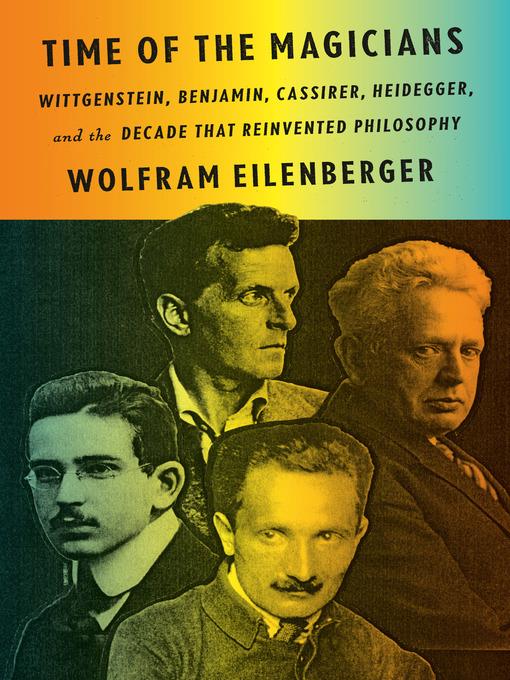
Time of the Magicians
Wittgenstein, Benjamin, Cassirer, Heidegger, and the Decade That Reinvented Philosophy
کتاب های مرتبط
- اطلاعات
- نقد و بررسی
- دیدگاه کاربران
نقد و بررسی

May 1, 2020
A readable, expert introduction to some of the most abstruse yet influential philosophical thought of the 20th century. No quartet of contemporaneous philosophers ever had a greater impact on popular thinking, as well as on formal thought, than the figures whom Eilenberger terms "magicians." That word is the single slip-up (and a minor one) in this enthralling tale of four men whose fresh consideration of thought, sign, and language--variously termed phenomenology, semiotics, linguistics, and epistemology--revolutionized serious philosophical thought in the decade after World War I. Ably translated by Whiteside, Eilenberger's book is the kind of limpid presentation of Continental philosophical expression rare in books about the subject. It's an achievement that has already won plaudits and prizes abroad. That's no doubt due to the author's own professional standing as a philosopher, but it also owes much to his approach: a multilayered exploration of the lives and thoughts of four very different thinkers at a time when Western and Central Europe struggled to emerge from war and economic crisis before slipping into the horrors of Nazism. The imposing Ludwig Wittgenstein, the hapless Walter Benjamin, the always troubling Martin Heidegger, and the steady, placid Ernst Cassirer emerge from Eilenberger's portrait as formidable minds attached to flawed personalities whose sometimes barely comprehensible formulations nevertheless transformed the way human understanding is now seen by philosophers. The book's special value lies in greatly advancing accessibility to these men's works and thought. So clear and sometimes jaunty is Eilenberger that no reader will miss out from understanding the narrative. One can complain only that he, too, rarely makes known his own views. Otherwise, his lucid presentation of his characters' often hard-to-comprehend thinking and the muddy language in which they expressed it make this book invaluable for anyone seeking to learn about these extraordinary figures. An exemplary work of scholarship that is comprehensible to everyone. (16-page b/w photo insert)
COPYRIGHT(2020) Kirkus Reviews, ALL RIGHTS RESERVED.

May 25, 2020
Four intellectuals hash out puzzling new worldviews after WWI in this spirited yet murky historical study. Philosophie Magazin editor Eilenberger (Finnen von Sinnen) follows the evolving thoughts of four German-speaking philosophers through the 1920s: Ludwig Wittgenstein, who dissected the meaning of language (or lack thereof); Walter Benjamin, a philosophy PhD and journalist who theorized about art, technology, and urban experience; Martin Heidegger, whose Being and Time probed the impact of death and anxiety on the soul; and Heidegger’s antagonist, Ernst Cassirer, who philosophized about symbols and metaphysics. The author weaves in colorful biographical sketches—Wittgenstein gave away a fortune and became a schoolteacher; Benjamin dissipated himself in affairs, drugs, and misfired writing projects—but primarily focuses on common themes in their writings, such as the tension between freedom and determinism, and the drive to escape convention and lead an authentic life. In Whiteside’s serviceable translation, Eilenberger gamely tries to elucidate his subjects’ famously knotty ideas, but the results—“Man is the only creature that is open to the experience of nothingness at the ground of being,” he writes, paraphrasing Heidegger—often confirm just how difficult to parse those concepts were. Still, this comprehensive and well-informed treatment deserves credit for bringing four major philosophers down from the heights of abstraction.

Starred review from July 1, 2020
In the decade 1919-29, four young philosophers would struggle to chart new ways out of the intellectual tailspin brought on by World War I and its aftermath. German journalist philosopher Eilenberger's 2018 Bavarian Book Prize-winning book astutely weaves the personal struggles, careers, loves, and philosophical products of four thinkers who profoundly shaped 20th-century philosophy: Ludwig Wittgenstein, the ascetic of Austria whose first book spawned a philosophical movement based on a fundamental misunderstanding of it; Walter Benjamin, the spendthrift radical critic, unable to keep his word or finish a project; Ernest Cassirer, carrying on traditional philosophical pursuits in language and symbolic forms; and this book's grown-up in the room, only to be upstaged by the young Martin Heidegger, willing to use others in his chase of academic status. Eilenberger's concise and clear explanations of some of the century's most confounding philosophical texts are illuminating. His research astutely draws on primary texts and the best secondary literature. VERDICT This book is a tapestry of contrasts and conjunctions; both colorful and elegant, juxtaposing smooth and rough in a narrative structure that surprises, explains, and compels readers ever forward. Highly recommended.--Steve Young, McHenry Cty. Coll., Crystal Lake, IL
Copyright 2020 Library Journal, LLC Used with permission.

























دیدگاه کاربران